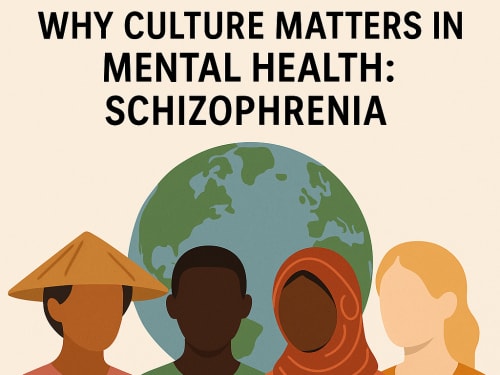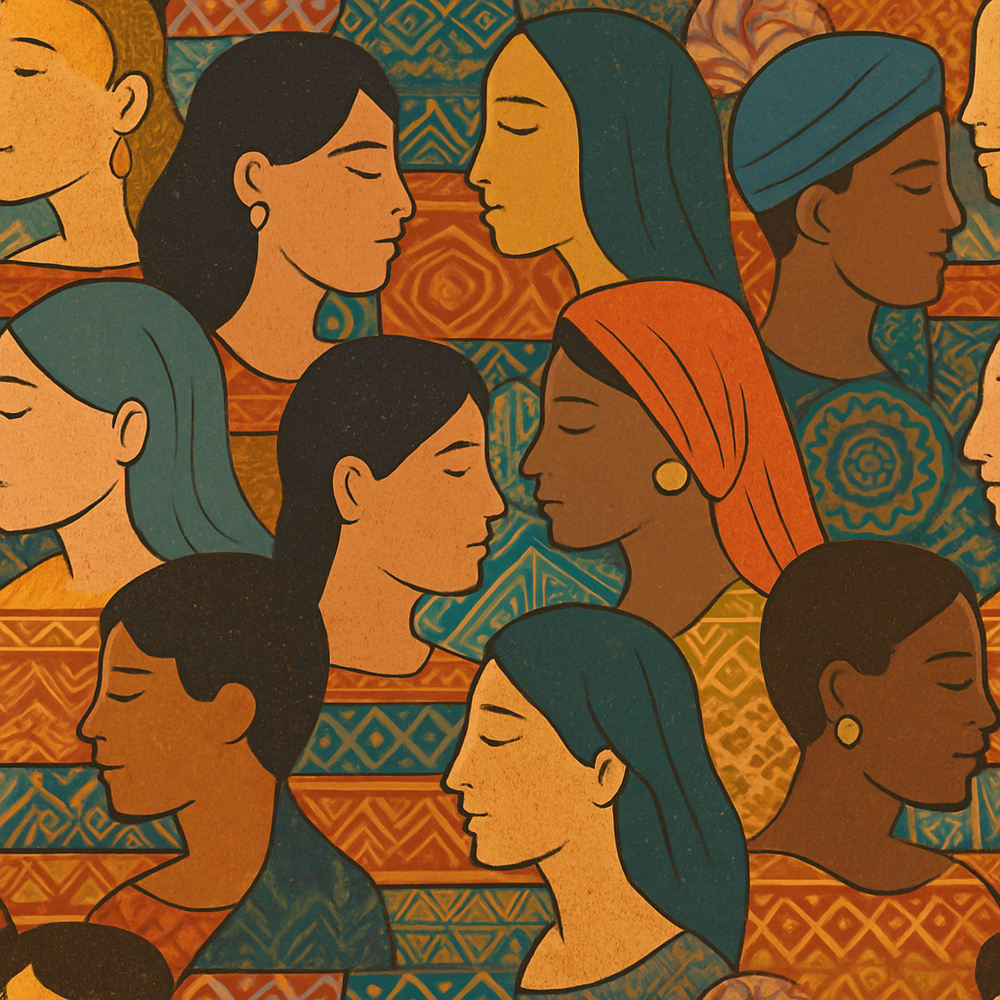🌍 Why Culture Matters in Mental Health: Schizophrenia

posted 11th November 2025

🌍 Why Culture Matters in Mental Health: Schizophrenia
Mental health is experienced differently across the world. The way we define, interpret, and treat psychological distress is shaped by culture; by our values, beliefs, and the stories our communities tell about the mind. In some cultures, mental illness carries deep stigma; in others, it’s approached with empathy, spirituality, or even reverence.
Understanding these differences reminds us that there’s no single, universal approach to mental health. Culture influences both how symptoms are recognised and how recovery happens.
🧠 How Culture Shapes Mental Health
Culture doesn’t just influence how we talk about mental health; it also affects how symptoms are felt and expressed. One person might describe anxiety as racing thoughts, while another may feel it as pressure in the chest or a heavy spirit. These differences impact whether someone seeks help, what types of support they trust, and how professionals interpret their experiences.
🌀 Schizophrenia Across Cultures
Schizophrenia illustrates the powerful role of culture. According to the DSM-5 (American Psychiatric Association, 2013), schizophrenia involves two or more symptoms lasting six months or longer, including delusions, hallucinations, disorganized speech, catatonia, or negative symptoms. Yet, the meaning and experience of these symptoms vary widely:
- 🌸 Vietnam: Hallucinations and unusual behaviour may be seen as communication with ancestors or punishment for family misdeeds. Family ties and stigma around psychiatry influence how symptoms are expressed and managed (Gaines, 2014).
- 🇺🇸 U.S. compared to 🇮🇳 India & 🇬🇭 Ghana: Luhrmann et al. (2015) found Americans were more likely to hear violent or frightening voices, while participants in India and Ghana described kind or helpful voices. This shows that social context shapes both the content of hallucinations and how distressing they feel.
- 🌺 Japan: In Japan, schizophrenia (known as tōgō shitchō-shō) was historically viewed as a disorder of the self or spirit rather than the brain. Cultural norms around emotional restraint often lead to less overt symptom expression, with individuals showing social withdrawal(hikikomori) rather than visible psychotic behaviour (Kohrt & Mendenhall, 2015).
- 🌍 Cross-cultural findings: A systematic review by Ceylan & Yalçınkaya Alkar (2023) found that while auditory hallucinations occur across cultures, visual hallucinations appear more frequently in Africa, Asia, the Middle East, and the Caribbean than in Europe or North America. The themes and meanings of hallucinations also varied, often reflecting regional religious or cultural beliefs.

🌏 Cultural Differences in Understanding Schizophrenia
- 🇨🇳 China and 🇬🇧 Britain: Chinese participants often attributed schizophrenia to religious or supernatural causes like spirit possession. Symptoms such as hearing voices might be interpreted as spiritual experiences rather than as illnesses. British participants leaned toward biological or psychological explanations and were more likely to seek medical treatment (Furnham and Wong, 2007).
- 🇳🇬 Nigeria and 🇬🇧 Britain: Nigerians often saw schizophrenia as caused by witchcraft or curses, leading families to prioritize traditional or faith-based healing before medical care. British participants interpreted the same symptoms through a medical lens, showing how culture guides both understanding and treatment (Furnham and Igboaka, 2007).
- Indigenous communities: In Indigenous populations, hearing voices may be seen as ancestral communication rather than a symptom of illness. However, colonization, systemic racism, and historical trauma increase vulnerability to mental distress. Western diagnostic systems can mislabel culturally normative spiritual experiences as pathological, highlighting the need for culturally sensitive care (Psych Central, 2021).

💭 Stigma and Schizophrenia
- Stigma surrounding schizophrenia differs across cultures — but it remains one of the most significant barriers to treatment and recovery.
- In many Western societies, schizophrenia is often associated with danger, unpredictability, or violence, leading to fear and social exclusion (Angermeyer et al., 2020).
- In some Asian contexts, a diagnosis can bring shame not only to the individual but to their entire family, discouraging people from seeking psychiatric care and increasing reliance on spiritual or traditional healers.
- In other cultures where psychotic symptoms are viewed through a spiritual lens, individuals may face less personal stigma but greater misunderstanding from medical systems.
- A cross-cultural study (Angermeyer et al., 2016) comparing Tunisia and Germany found that stigma around schizophrenia was strong in both countries, but it looked different. In Tunisia, people were more likely to see individuals as responsible for their illness but also showed more supportive attitudes, while in Germany, people tended to keep a greater social distance.
- Across the world, stigma delays help-seeking, affects self-esteem, and can make recovery more difficult — showing that cultural beliefs shape not just how schizophrenia is experienced, but also how those living with it are treated.
🌿 Why Cultural Sensitivity Matters
Recognising cultural differences isn’t about replacing science with spirituality; it’s about understanding that both shape how people experience mental health. Mental health professionals must approach every client with cultural humility: asking, listening, and understanding before diagnosing.
Culturally informed care considers how beliefs, traditions, and social context influence distress and recovery. When clinicians respect this — by including spirituality, family, or traditional healing practices - treatment becomes more effective, empowering, and humane.
📚 References
American Psychiatric Association. (2013). Diagnostic and Statistical Manual of Mental Disorders (5th ed.). Washington, DC: Author.
Angermeyer, M. C., Holzinger, A., Carta, M. G., & Schomerus, G. (2020). Biogenetic explanations and public acceptance of mental illness: Systematic review of population studies. The British Journal of Psychiatry, 196(5), 327–332.
Angermeyer, M.C., Carta, M.G., Matschinger, H., Millier, A., Refaï, T., Schomerus, G. and Toumi, M. (2016). Cultural differences in stigma surrounding schizophrenia: Comparison between Central Europe and North Africa. British Journal of Psychiatry, 208(4), pp.389–397. doi:https://doi.org/10.1192/bjp.bp.114.154260.
Ceylan, A. C., & Yalçınkaya Alkar, Ö. (2023). The cross-cultural differences in symptoms of schizophrenia: A systematic review. Journal of Cognitive Behavioral Psychotherapy and Research, 12(1), 1–9. https://jcbpr.org/storage/upload/pdfs/1707476811-en.pdf
Furnham, A. and Igboaka, A. (2007). Young People’s Recognition and Understanding of Schizophrenia: a Cross-Cultural Study of Young People From Britain and Nigeria. International Journal of Social Psychiatry, 53(5), pp.430–446. doi:https://doi.org/10.1177/0020764007078348.
Furnham, A. and Wong, L. (2007). A cross-cultural comparison of British and Chinese beliefs about the causes, behaviour manifestations, and treatment of schizophrenia. Psychiatry Research, 151(1-2), pp.123–138. doi:https://doi.org/10.1016/j.psychres.2006.03.023.
Gaines, A. D. (2014). Cultural factors in schizophrenia. In R. J. Barrett & J. M. Jenkins (Eds.), Schizophrenia, culture, and subjectivity (pp. 85–110). Cambridge University Press.
Kohrt, B. A., & Mendenhall, E. (2015). Global mental health: Anthropological perspectives. Left Coast Press.
Luhrmann, T. M., Padmavati, R., Tharoor, H., & Osei, A. (2015). Differences in voice-hearing experiences of people with psychosis in the U.S.A., India, and Ghana: Interview-based study. The British Journal of Psychiatry, 206(1), 41–44.
Ng, C. H., Schweitzer, I., & Lai, S. (2007). The stigma of schizophrenia: Cultural and gender differences. International Review of Psychiatry, 19(4), 451–459.
Psych Central. (2021). How Indigenous views of mental health differ from Western approaches. Retrieved from https://psychcentral.com/




